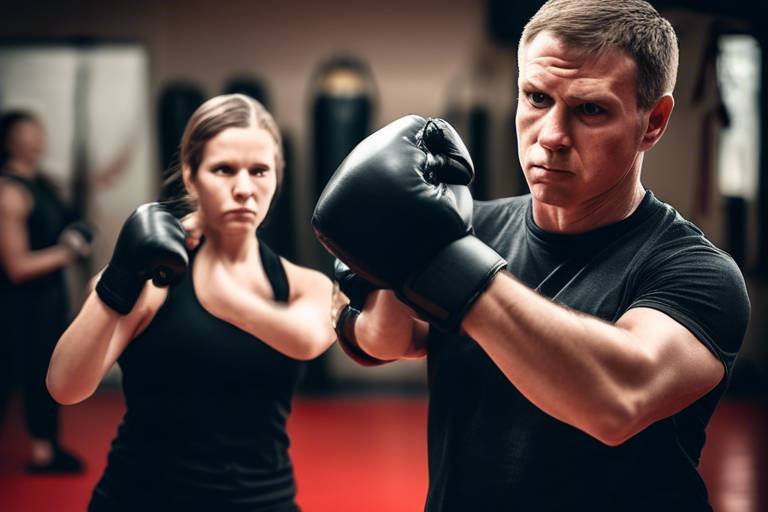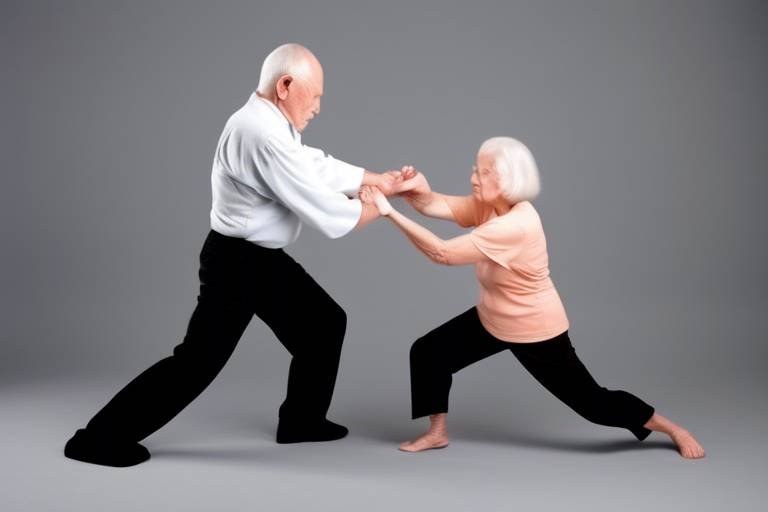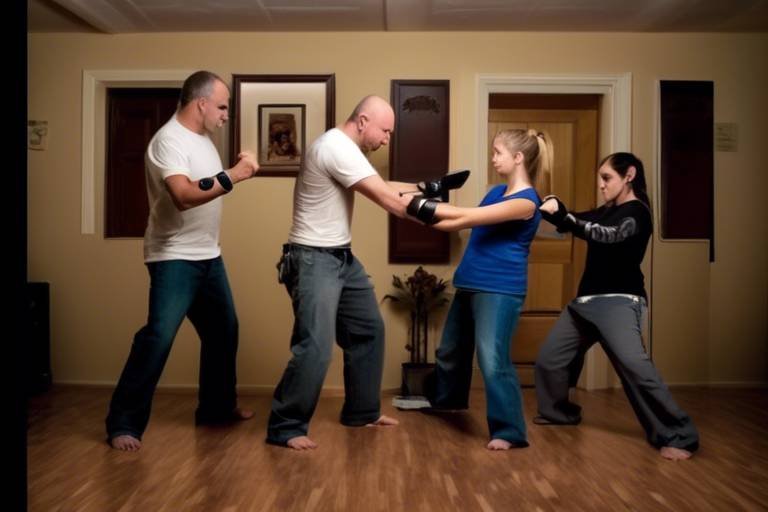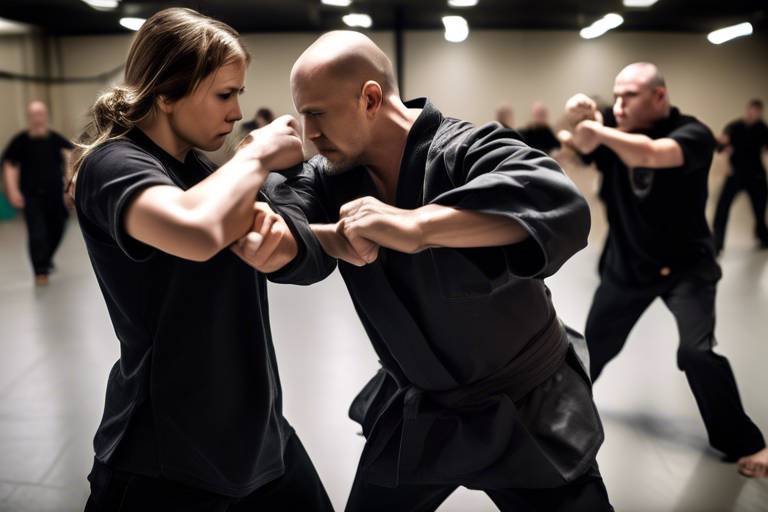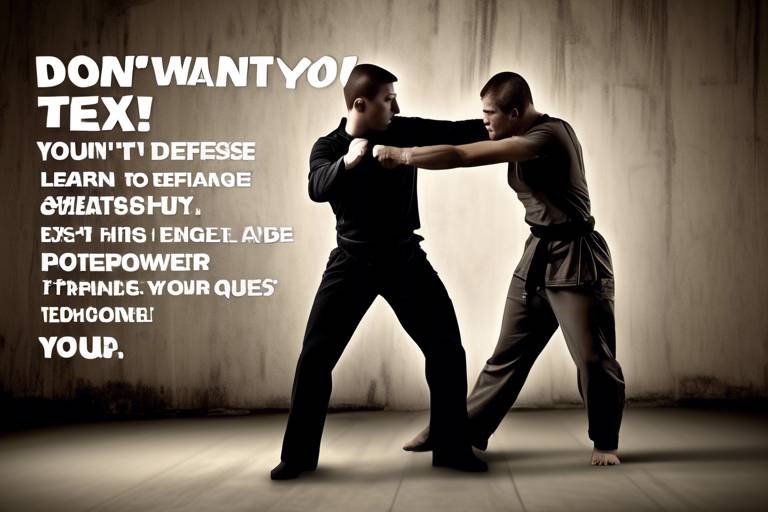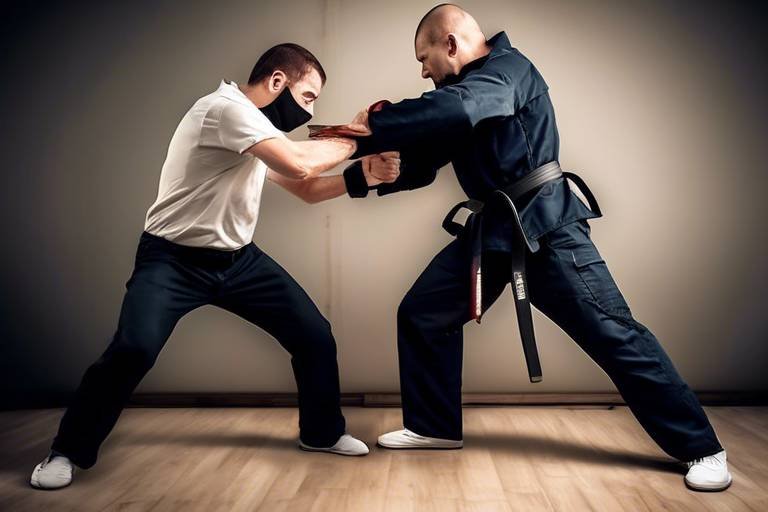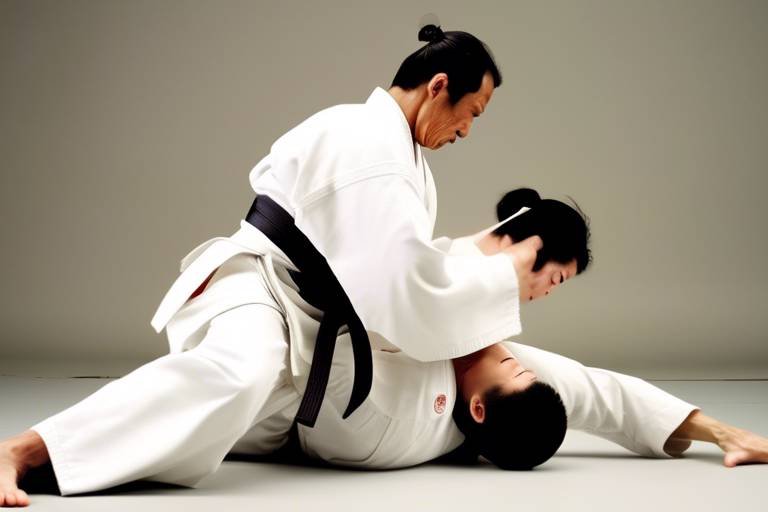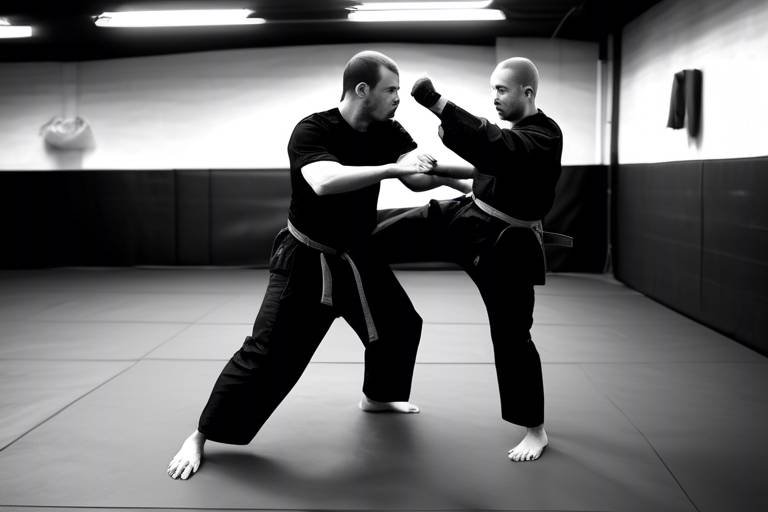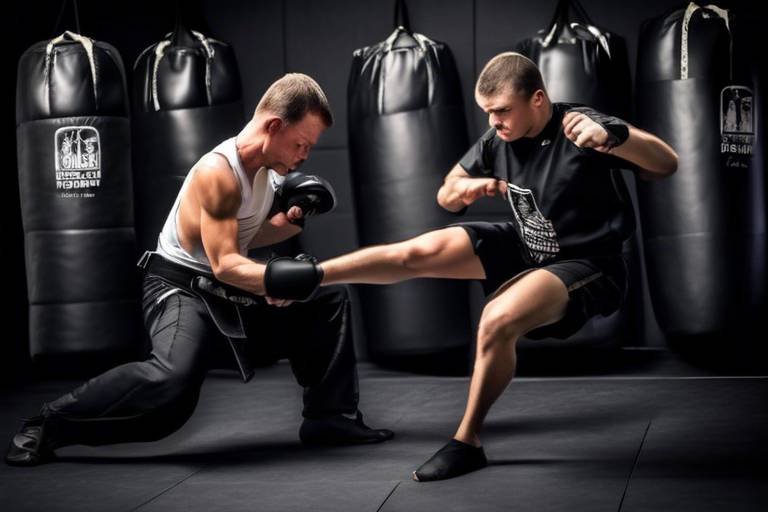Pros and Cons of Incorporating Weapons in Self-Defense Training
When it comes to self-defense training, the conversation often shifts toward the inclusion of weapons. This topic is not just a passing trend; it’s a significant aspect of personal safety and preparedness. The debate surrounding the use of weapons in self-defense training is multifaceted, encompassing a variety of perspectives, experiences, and outcomes. On one hand, weapon training can bolster an individual's confidence and preparedness, while on the other, it raises concerns about safety and legal implications. In this article, we will dive deep into the advantages and disadvantages of incorporating weapons into self-defense training, exploring how it impacts personal safety, training effectiveness, and the psychological dimensions of self-defense.
Self-defense training is more than just a physical exercise; it embodies a philosophy of empowerment and awareness. At its core, self-defense training encompasses a variety of techniques and strategies designed to protect oneself from harm. This includes everything from unarmed combat techniques to the use of personal defense weapons. The fundamental principles of self-defense training revolve around awareness, avoidance, and action. By understanding these principles, individuals equip themselves not only with physical skills but also with the mental fortitude to handle potentially dangerous situations. The ultimate objective is to ensure that individuals can respond effectively in a crisis, whether that means defusing a situation or physically defending themselves.
Incorporating weapons into self-defense training can significantly enhance effectiveness and preparedness. One of the most notable benefits is the increase in confidence that comes from mastering weapon handling. Imagine walking down the street, knowing that you possess the skills to defend yourself if necessary. This feeling of empowerment can be transformative. Additionally, weapon training fosters greater situational awareness, as individuals learn to assess their surroundings and recognize potential threats. In this way, weapon training does not merely prepare individuals for physical confrontations; it also sharpens their perception and instinctual responses.
Learning to use weapons can dramatically boost an individual's confidence in their ability to protect themselves. When you train with weapons, you are not just learning how to wield them; you are also cultivating a mindset of preparedness. This newfound confidence can spill over into various aspects of life, making individuals feel more secure in their daily activities. Think of it as building a mental fortress—once you know you can defend yourself, the world seems a little less intimidating. This psychological advantage can be crucial in high-pressure situations where fear can often paralyze a person’s ability to act.
Understanding weapon use helps individuals mentally prepare for potential confrontations. The reality is, when faced with a threatening situation, many people experience a surge of adrenaline and fear. However, those who have undergone weapon training often find that they can manage these emotions more effectively. This is because they have rehearsed various scenarios and learned to respond rather than react. The psychological benefits of weapon training extend beyond just the physical act of defending oneself; they also include the mental resilience to face danger head-on.
Weapon training also improves physical skills such as coordination and reflexes. Think of it like learning to dance; at first, the moves may feel awkward, but with practice, they become fluid and instinctive. Similarly, as individuals train with weapons, they develop muscle memory and enhance their overall self-defense capabilities. This physical skill development is invaluable, as it prepares individuals not only to handle weapons but also to respond effectively in high-stress situations where quick reflexes can make all the difference.
Training with weapons encourages individuals to develop greater situational awareness. This means being conscious of your environment, recognizing potential threats, and understanding how to react appropriately. The ability to assess situations and make informed decisions is crucial in self-defense scenarios. For instance, a trained individual might notice subtle cues that indicate a possible threat, allowing them to avoid confrontation altogether. In essence, weapon training cultivates a heightened sense of vigilance that can be the difference between safety and danger.
While weapon training has its advantages, it also presents certain drawbacks that must be considered. The use of weapons can lead to accidental injuries if not handled properly. Safety concerns are paramount, especially in environments where individuals may not have extensive training. Furthermore, weapon use in self-defense raises important legal and ethical questions. The implications of using weapons in various situations cannot be overlooked, emphasizing the need for responsible training and awareness of local laws.
The use of weapons can lead to accidental injuries if not handled properly. This is a serious concern, as even a momentary lapse in judgment can have severe consequences. Proper training and adherence to safety protocols are essential to mitigate these risks. Just as a driver must learn the rules of the road to prevent accidents, so too must individuals training with weapons understand the importance of safety measures.
Weapon use in self-defense raises important legal and ethical questions. The implications of using weapons in various situations can be complex and vary widely by jurisdiction. It is crucial for individuals to understand the laws governing self-defense in their area to avoid legal repercussions. Additionally, ethical considerations come into play when determining whether the use of a weapon is justified in a given situation. This underscores the importance of responsible training and education in self-defense.
- Is weapon training necessary for self-defense? Weapon training can enhance self-defense skills, but it is not strictly necessary. Many effective self-defense techniques do not involve weapons.
- What types of weapons are commonly used in self-defense training? Commonly used weapons include pepper spray, knives, and firearms, depending on the training program and local laws.
- How can I ensure my safety during weapon training? Always prioritize safety by following training protocols, using proper equipment, and training under the guidance of certified instructors.

Understanding Self-Defense Training
This article discusses the advantages and disadvantages of using weapons in self-defense training, evaluating their impact on personal safety, training effectiveness, and psychological aspects.
Self-defense training is more than just a series of physical moves; it's a comprehensive approach aimed at equipping individuals with the skills and knowledge necessary to protect themselves from harm. Think of it as a personal empowerment journey, where the goal is to build not only physical capabilities but also mental resilience. The fundamental principles of self-defense training revolve around awareness, avoidance, and action. These principles serve as the foundation upon which all self-defense techniques are built.
At its core, self-defense training emphasizes the importance of understanding one's environment. This means being aware of potential threats and learning to read situations accurately. For example, a well-trained individual can often sense danger before it escalates, allowing them to avoid confrontation altogether. This proactive approach is crucial because, as the saying goes, "an ounce of prevention is worth a pound of cure." In many cases, simply being aware and prepared can deter a potential attacker.
Moreover, self-defense training encompasses various techniques, from martial arts to weapon handling. Each method has its own set of advantages and can be tailored to suit individual preferences and needs. For instance, some people may feel more comfortable using their body as a weapon, while others may prefer to incorporate tools such as pepper spray or personal alarms. Regardless of the chosen method, the ultimate objective remains the same: to empower individuals to protect themselves effectively.
It's also essential to recognize that self-defense training is not solely about physical prowess. The psychological aspect plays a significant role in how individuals respond to threats. Training helps cultivate a mindset geared towards survival and quick decision-making. This mental preparedness can be the difference between freezing in fear and taking decisive action. In essence, self-defense training is about creating a comprehensive skill set that includes physical techniques, mental strategies, and emotional resilience.
In conclusion, understanding self-defense training requires recognizing its multifaceted nature. It combines physical skills, situational awareness, and psychological readiness to create a robust defense mechanism. Whether one chooses to incorporate weapons or not, the fundamental goal remains the same: to feel empowered and prepared to face any potential threat.
Incorporating weapons into self-defense training can enhance effectiveness and preparedness. This section highlights the key benefits, such as increased confidence and improved situational awareness.
Learning to use weapons can significantly boost an individual's confidence in their ability to protect themselves. This subheading examines how weapon training contributes to self-assurance.
Understanding weapon use helps individuals mentally prepare for potential confrontations. This subsection delves into the psychological advantages of being trained in weapon handling.
Weapon training improves physical skills such as coordination and reflexes. This part discusses how these skills benefit overall self-defense capabilities.
Training with weapons encourages individuals to develop greater situational awareness. This section explains how awareness plays a crucial role in self-defense scenarios.
While weapon training has its advantages, it also presents certain drawbacks. This section outlines the potential risks and concerns associated with incorporating weapons into self-defense training.
The use of weapons can lead to accidental injuries if not handled properly. This subheading explores the safety concerns that arise from weapon training.
Weapon use in self-defense raises important legal and ethical questions. This part discusses the implications of using weapons in various situations, emphasizing the need for responsible training.
Q1: Is self-defense training only for women?
A1: Absolutely not! Self-defense training is beneficial for individuals of all genders and ages. Everyone can benefit from learning how to protect themselves.
Q2: Do I need to have prior experience to start weapon training?
A2: No prior experience is necessary. Many self-defense classes cater to beginners and provide a safe environment for learning.
Q3: What types of weapons are typically used in self-defense training?
A3: Common weapons include pepper spray, personal alarms, and sometimes firearms, depending on the training program and local laws.
Q4: Can self-defense training help with anxiety or fear of confrontation?
A4: Yes! Many people find that self-defense training not only equips them with skills but also boosts their confidence and reduces anxiety about potential threats.

Benefits of Weapon Training
Incorporating weapons into self-defense training can be a game changer, enhancing not only the effectiveness of the training but also the individual's overall preparedness for real-life situations. When you think about self-defense, it's easy to imagine a scenario where you're faced with an attacker and need to react quickly. In such instances, having the ability to use a weapon can significantly shift the balance of power in your favor. The benefits of weapon training extend beyond just physical skills; they encompass psychological and situational awareness improvements as well.
One of the most profound advantages of weapon training is the enhanced confidence it instills in individuals. Imagine walking down a street, feeling a sense of unease. Now, picture yourself equipped with the knowledge and skills to handle a weapon. This training fosters a sense of security, allowing you to navigate your environment with a newfound assurance. It's not just about the weapon itself, but the belief that you have the means to defend yourself if necessary. This confidence can permeate other areas of life, making you more assertive and less fearful in various situations.
Learning to use weapons can significantly boost an individual's confidence in their ability to protect themselves. The process of mastering a weapon—whether it be a firearm, a knife, or even a baton—requires practice and dedication. As you progress through your training, each small victory builds your self-esteem. You start to realize that you are capable of defending yourself, which can be incredibly empowering. This newfound confidence often translates into better decision-making skills when faced with potential threats. Instead of panicking, you’re more likely to assess the situation calmly and respond appropriately.
Understanding weapon use also helps individuals mentally prepare for potential confrontations. The psychological aspect of self-defense cannot be overstated. Many people fear the unknown, and a significant part of that fear comes from feeling unprepared. Weapon training equips you with the knowledge of how to react in high-pressure situations. This mental preparedness can mean the difference between freezing in fear and taking decisive action. Knowing that you have the skills to defend yourself can alleviate anxiety, allowing you to focus on what truly matters—your safety.
Furthermore, weapon training improves physical skills such as coordination and reflexes. The act of handling a weapon requires a level of physicality that translates well into other areas of self-defense. For instance, practicing with a firearm involves not just aiming, but also understanding how to handle recoil and manage your stance. These skills enhance your overall self-defense capabilities, making you a more well-rounded individual in terms of physical preparedness. You become more agile, responsive, and aware of your body’s movements, which is crucial in any self-defense scenario.
Training with weapons encourages individuals to develop greater situational awareness. In self-defense, awareness is your first line of defense. It’s about being alert to your surroundings and recognizing potential threats before they escalate. Weapon training often includes drills that emphasize the importance of assessing your environment, identifying escape routes, and understanding the dynamics of a confrontation. This heightened awareness not only helps in self-defense situations but also in everyday life, allowing you to navigate various social and public settings with a keener sense of observation.
In summary, the benefits of weapon training are multifaceted. From boosting confidence to enhancing psychological preparedness and physical skills, the advantages are clear. It’s not merely about learning to wield a weapon; it’s about transforming how you perceive threats and your ability to respond to them. As you embark on this journey of self-defense training, remember that each step you take is a step towards empowerment and safety.
- Is weapon training necessary for everyone? While not everyone may feel the need for weapon training, it can be beneficial for those who want to enhance their self-defense skills.
- What types of weapons are commonly used in training? Common weapons include firearms, knives, and personal defense tools like pepper spray or batons.
- Are there any age restrictions for weapon training? Age restrictions can vary based on local laws and the type of weapon; it's essential to check the regulations in your area.
- How can I find a reputable weapon training program? Look for certified instructors, read reviews, and ask for recommendations from trusted sources.

Enhanced Confidence
When it comes to self-defense, confidence is your best ally. Imagine walking down the street, feeling the weight of uncertainty on your shoulders. Now, picture yourself equipped with the skills and knowledge to handle potentially dangerous situations. That transformation is what enhanced confidence through weapon training can bring. Learning to use weapons not only equips you with the tools to defend yourself but also instills a sense of empowerment that can be life-changing.
Weapon training fosters a profound sense of self-assurance. It’s not just about knowing how to wield a physical object; it’s about understanding your own capabilities and limitations. When you practice regularly, you begin to trust your instincts and reactions, which can significantly reduce feelings of fear and anxiety. In a world where unpredictability is the norm, having a reliable skill set can make all the difference.
Furthermore, the psychological boost from weapon training extends beyond mere self-defense. It encourages a proactive mindset. Instead of waiting for danger to strike, you start to feel more in control of your environment. This newfound confidence can affect various aspects of life, from personal relationships to professional interactions. You may find yourself speaking up more, taking risks, and pursuing opportunities you might have previously shied away from.
Here’s a quick rundown of how weapon training enhances confidence:
- Skill Mastery: Regular practice leads to improved proficiency, which naturally boosts confidence.
- Reduced Fear: Familiarity with weapons can diminish the fear of the unknown, allowing you to approach situations with a clear mind.
- Empowerment: Knowing you can defend yourself fosters a sense of personal power and autonomy.
In essence, weapon training is not just about learning to fight; it’s about cultivating a mindset that embraces challenges and confronts fears head-on. Just like a knight in shining armor, you become your own protector, ready to face whatever comes your way with courage and confidence. So, whether you’re considering taking up a self-defense class or just want to feel more secure in your daily life, remember that the journey towards enhanced confidence begins with the first step of training.
- Is weapon training suitable for everyone? Yes, weapon training can be tailored to suit individuals of all skill levels and backgrounds.
- What types of weapons are typically used in self-defense training? Commonly used weapons include pepper spray, personal alarms, and firearms, depending on the training program.
- How long does it take to become proficient in weapon use? Proficiency varies by individual; however, consistent practice over several weeks or months is typically required.
- Are there age restrictions for weapon training? Yes, many training programs have age restrictions, especially for firearms training. Always check local laws and regulations.

Psychological Preparedness
When it comes to self-defense, the mind is just as crucial as the body. is about equipping oneself mentally to handle unexpected confrontations. Imagine walking into a room filled with strangers; your heart races, and your palms sweat. Now, consider how different it would feel if you had the training and knowledge to assess the situation calmly. This is the power of psychological readiness.
Weapon training plays a significant role in this mental preparation. By familiarizing oneself with the use of various weapons, individuals can reduce anxiety and fear associated with potential encounters. It’s like learning to ride a bike; at first, it seems daunting, but with practice, you gain confidence and control. The same applies here—understanding how to handle a weapon can transform fear into confidence.
Moreover, training with weapons encourages critical thinking and decision-making skills. In a self-defense scenario, every second counts. A well-trained individual can quickly evaluate the situation, decide whether to engage or retreat, and act accordingly. This mental agility can be the difference between safety and danger. Here’s how weapon training enhances psychological preparedness:
- Desensitization to Stress: Regular exposure to simulated confrontations helps individuals become accustomed to high-pressure situations.
- Improved Focus: Training requires concentration, which translates into better focus during real-life scenarios.
- Enhanced Decision-Making: Practicing various scenarios allows individuals to develop their judgment on when to use force and when to avoid confrontation.
In essence, psychological preparedness through weapon training not only boosts confidence but also equips individuals with the tools to navigate real-world threats effectively. It’s about creating a mindset that prioritizes safety while empowering individuals to make informed decisions. As they say, "It’s better to have it and not need it than to need it and not have it." This principle rings especially true in self-defense, where being mentally prepared can save lives.

Physical Skill Development
When it comes to self-defense training, one of the most significant advantages of incorporating weapons is the enhancement of physical skills. Engaging in weapon training demands a level of coordination and reflexes that can be transformative for individuals. Imagine yourself in a high-pressure situation where every second counts; the ability to react swiftly and accurately can mean the difference between safety and danger. By practicing with weapons, you not only learn how to handle them but also develop essential physical attributes that are crucial in self-defense scenarios.
Weapon training is not just about learning to shoot or wield a tool; it's about developing a comprehensive set of skills that include balance, agility, and timing. These skills are interrelated and can enhance your overall physical fitness. For instance, during training sessions, you may find yourself performing various drills that require you to move in different directions quickly while maintaining control of the weapon. This kind of dynamic movement can significantly improve your coordination and reflexes, making you more adept at responding to unexpected threats.
Furthermore, the training often involves repetitive practice, which is essential for muscle memory. Just like a musician practices scales to master their instrument, those training with weapons engage in repetitive drills that reinforce their skills. Over time, these actions become instinctual, allowing individuals to react almost automatically in real-life situations. This kind of training can lead to a heightened sense of readiness, where your body is primed to respond to threats without needing to consciously think about it.
Additionally, weapon training can serve as a great workout. Many training sessions include physical conditioning elements that enhance strength and endurance. For example, lifting weights or performing resistance exercises might be integrated into the training regimen to ensure that individuals are not only skilled but also physically capable of handling the demands of self-defense. This holistic approach to physical skill development is an invaluable aspect of weapon training.
In summary, the physical skill development gained from weapon training extends far beyond just knowing how to use a weapon. It encompasses a variety of physical attributes that can enhance your overall self-defense capabilities. By honing your coordination, reflexes, balance, and strength, you become not just a more effective defender but also a more confident individual, ready to face any challenge that may come your way.
- What types of weapons are commonly used in self-defense training?
Common weapons include pepper spray, stun guns, and personal firearms, depending on the laws and regulations of your area.
- Is weapon training suitable for everyone?
While weapon training can be beneficial, it's essential to consider personal comfort levels, physical capabilities, and legal implications before engaging in such training.
- How can I find a qualified instructor for weapon training?
Look for certified self-defense schools or instructors with experience in weapon handling and safety. Reviews and recommendations can also help in making a choice.
- What are the legal implications of using a weapon in self-defense?
Legal implications vary by location, so it's crucial to understand local laws regarding self-defense and weapon use to ensure responsible training and usage.

Situational Awareness
When it comes to self-defense, is like having a sixth sense. It's that inner radar that helps you detect danger before it becomes a threat. Imagine walking through a crowded market; your ability to notice subtle changes in your surroundings can mean the difference between safety and harm. By incorporating weapon training into your self-defense regimen, you not only learn how to handle a weapon but also sharpen your ability to read situations. This heightened awareness is crucial because, in many self-defense scenarios, the first line of defense is recognizing a potential threat before it escalates.
Training with weapons forces you to adopt a mindset that is always on the lookout for potential dangers. You'll learn to observe people’s body language, listen to the sounds around you, and notice the little details that could indicate something is off. For instance, if you spot someone acting suspiciously in a parking lot, your weapon training will likely prompt you to assess the situation more critically. Are they alone? Do they seem agitated? This kind of critical thinking is invaluable in self-defense situations, where split-second decisions can save your life.
Moreover, situational awareness isn't just about being alert; it's about being proactive. The more you practice weapon handling, the more you understand the dynamics of confrontation. You'll start to recognize patterns in behavior and environmental cues that could signal an impending threat. This knowledge empowers you to take action before a situation spirals out of control. In essence, weapon training enhances your ability to assess risks and make informed decisions, transforming you from a passive observer into an active participant in your own safety.
In conclusion, the integration of weapon training into self-defense not only equips you with physical skills but also amplifies your situational awareness. This dual benefit enables you to navigate potentially dangerous situations with confidence and clarity. As you become more adept at recognizing threats, you’ll find that you can respond more effectively, whether that means de-escalating a situation or preparing to defend yourself if necessary.
- What is situational awareness?
Situational awareness refers to the ability to perceive and understand your environment, particularly in terms of potential threats. It's about being aware of what's happening around you and making informed decisions based on that awareness.
- How can weapon training improve my situational awareness?
Weapon training teaches you to focus on your surroundings, recognize patterns, and assess risks, which enhances your overall situational awareness.
- Is situational awareness only important in self-defense scenarios?
No, situational awareness is a valuable skill in everyday life, helping you stay safe in various situations, from navigating busy streets to avoiding potential hazards.

Drawbacks of Weapon Training
While the idea of incorporating weapons into self-defense training can seem appealing, it's crucial to consider the potential drawbacks that come along with it. One of the most significant concerns is the increased risk of accidents. Weapons, by their very nature, can be dangerous. Even with the best intentions, mishandling a weapon can lead to severe injuries or even fatalities. This risk is compounded in training environments where adrenaline is high, and individuals may not always be fully aware of their surroundings. It's essential to recognize that a moment of inattention can have dire consequences, making rigorous safety protocols absolutely vital.
Moreover, the psychological impact of weapon training cannot be overlooked. For some individuals, learning to handle a weapon may foster a sense of invincibility. This can lead to dangerous overconfidence, where the trained individual might underestimate the risks of a real-life confrontation. The belief that a weapon will always provide an advantage can create a false sense of security, potentially resulting in poor decision-making during critical moments. In essence, while training can equip individuals with the skills to use a weapon, it can also inadvertently encourage them to rely too heavily on that weapon, rather than developing other essential self-defense skills.
Another important aspect to consider is the legal and ethical considerations surrounding weapon use in self-defense situations. Different regions have varying laws regarding the use of weapons, and what may be permissible in one area could land someone in legal trouble in another. Understanding these laws is crucial for anyone considering weapon training. Moreover, ethical dilemmas can arise when contemplating the use of lethal force. Questions about when it is appropriate to use a weapon, and whether the situation truly warrants such a response, can weigh heavily on an individual’s conscience. This psychological burden can lead to stress and anxiety, which could deter some individuals from pursuing weapon training altogether.
Lastly, weapon training can sometimes overshadow the importance of non-lethal self-defense techniques. Many self-defense scenarios do not require the use of a weapon, and focusing too much on weapon training can lead to neglecting other crucial skills such as de-escalation techniques, situational awareness, and physical self-defense maneuvers. It's vital for individuals to strike a balance in their training, ensuring they are well-rounded in all aspects of self-defense, rather than overly fixated on weapon use.
In summary, while weapon training can offer numerous benefits, it also presents significant drawbacks that must be carefully considered. The risks of accidents, the psychological effects of reliance on weapons, legal and ethical implications, and the potential neglect of non-lethal techniques are all factors that should weigh heavily in the decision to incorporate weapons into self-defense training. A comprehensive approach to self-defense that includes both weapons and unarmed techniques is likely to provide the best preparation for any potential confrontation.
- What are the main risks associated with weapon training?
The main risks include accidental injuries, overconfidence in using weapons, and potential legal issues related to weapon use in self-defense situations.
- How can I ensure safety during weapon training?
Always follow strict safety protocols, use proper equipment, and train under the supervision of qualified instructors to minimize risks.
- Are there alternatives to weapon training for self-defense?
Yes, alternatives include learning physical self-defense techniques, situational awareness training, and de-escalation strategies.
- What should I consider before starting weapon training?
Consider your local laws regarding weapon use, the psychological impact of weapon training, and the importance of a balanced self-defense skill set.

Increased Risk of Accidents
When it comes to self-defense training, the incorporation of weapons can undoubtedly elevate the stakes. While the potential benefits are enticing, we must also confront the harsh reality that the use of weapons carries an increased risk of accidents. Imagine a scenario where a novice is handling a firearm for the first time; the adrenaline is pumping, and the pressure is on. If proper training and safety protocols aren't followed, the outcome can be catastrophic. This is not merely a theoretical concern; statistics show that a significant percentage of self-defense training accidents occur due to improper handling and a lack of understanding of weapon mechanics.
Moreover, safety is not just a personal responsibility but a collective one. Training environments should be equipped with stringent safety measures, including:
- Qualified instructors who emphasize safety protocols
- Regular drills to reinforce safe handling practices
- Proper storage and maintenance of weapons
While these measures can mitigate risks, they cannot eliminate them entirely. The potential for accidents increases in high-pressure situations, where the stress of a real-life confrontation can lead to split-second decisions that might not be safe. For instance, in a moment of panic, a person might mistakenly discharge a weapon, causing unintended harm to themselves or others. This is why it's crucial to not only focus on the physical aspects of weapon training but also to cultivate a mindset of responsibility and awareness.
Additionally, the psychological impact of weapon training cannot be overlooked. The more familiar one becomes with a weapon, the more comfortable they may feel in using it. However, this familiarity can sometimes lead to complacency, where individuals might underestimate the risks involved. The line between confidence and recklessness is thin, and when weapons are involved, crossing that line can have dire consequences.
In conclusion, while weapon training can enhance self-defense capabilities, it is imperative to recognize and address the increased risk of accidents associated with it. Comprehensive training that prioritizes safety, responsibility, and awareness can help mitigate these risks, but individuals must remain vigilant. The journey towards effective self-defense is not just about mastering techniques; it’s also about understanding the profound responsibilities that come with wielding a weapon.
- What are the most common types of accidents in weapon training? Accidents often involve misfires, injuries during handling, and accidents during storage.
- How can I ensure safety during weapon training? Always follow the guidelines set by your instructor, practice regularly, and never handle a weapon without proper supervision.
- Are there alternatives to weapon training for self-defense? Yes, many self-defense classes focus on unarmed techniques that can be just as effective in protecting oneself.

Legal and Ethical Considerations
When it comes to incorporating weapons into self-defense training, the cannot be overlooked. Understanding the laws surrounding weapon use is crucial, as these regulations vary significantly from one jurisdiction to another. For instance, some places may have strict laws regarding the carrying of firearms, while others might allow more lenient regulations. This disparity can lead to confusion and potential legal ramifications for those who are not well-informed.
Moreover, the ethical implications of using weapons for self-defense raise important questions about responsibility and intent. Are individuals prepared to handle the consequences of using a weapon, even in self-defense? The decision to use a weapon can have profound implications, not just for the person defending themselves, but also for the assailant and any bystanders. In many cases, the use of a weapon can escalate a situation that might otherwise have been resolved through non-violent means.
To navigate these complexities, individuals must consider several factors:
- Knowledge of Local Laws: It’s essential to be aware of the laws regarding weapon possession and use in your area. This includes understanding when it is legally permissible to use a weapon in self-defense.
- Training and Certification: Many jurisdictions require individuals to undergo specific training and obtain certifications before carrying a weapon. This not only ensures that individuals are skilled in weapon handling but also reinforces the importance of responsible ownership.
- Ethical Responsibility: Beyond the legal aspects, there is a moral obligation to consider the potential consequences of weapon use. Individuals must ask themselves if they are prepared to handle the aftermath of using a weapon, including legal battles, emotional trauma, and the impact on their community.
Furthermore, the implications of using weapons in self-defense extend beyond personal safety. They can influence public perception of self-defense training as a whole. If weapon use is perceived as reckless or irresponsible, it can result in a negative stigma surrounding self-defense training programs. This highlights the need for comprehensive education that emphasizes not just the mechanics of weapon handling, but also the underlying principles of responsibility and accountability.
In conclusion, while the incorporation of weapons in self-defense training can enhance an individual's preparedness, it is imperative to approach this topic with a clear understanding of the legal and ethical landscape. By equipping themselves with knowledge and skills, individuals can make informed decisions that prioritize safety for themselves and those around them.
- What are the legal requirements for carrying a weapon for self-defense?
Legal requirements vary by location. It's crucial to research local laws regarding weapon possession and self-defense. - Is weapon training necessary for effective self-defense?
While not necessary for everyone, weapon training can enhance self-defense skills for those who choose to incorporate it. - What ethical considerations should I keep in mind when using a weapon?
Consider the potential consequences of using a weapon, including the impact on others and the legal ramifications of your actions.
Frequently Asked Questions
- What are the main benefits of incorporating weapons into self-defense training?
Incorporating weapons into self-defense training can significantly enhance your effectiveness and preparedness. It boosts your confidence, improves situational awareness, and develops essential physical skills like coordination and reflexes. With proper training, you become more adept at handling various situations, making you feel more secure in your ability to protect yourself.
- How does weapon training increase confidence?
Learning to handle weapons can dramatically increase your self-assurance. When you know how to use a weapon, you feel more capable of defending yourself in a potential confrontation. This confidence translates into a more assertive demeanor, which can deter potential threats even before they occur.
- What psychological benefits come from weapon training?
Weapon training helps individuals mentally prepare for confrontations, allowing them to think clearly under pressure. Understanding weapon use can alleviate fear and anxiety about potential attacks, fostering a sense of control over one’s safety. This psychological preparedness is crucial in high-stress situations where quick decisions are necessary.
- Are there any risks associated with weapon training?
Yes, there are risks involved with weapon training, primarily the increased potential for accidents if weapons are not handled properly. It’s essential to undergo thorough training and follow strict safety protocols to minimize these risks. Additionally, understanding the legal and ethical implications of using weapons in self-defense is vital.
- What legal considerations should I be aware of when using weapons for self-defense?
Using weapons in self-defense raises significant legal and ethical questions. Laws vary by location, so it's crucial to understand your rights and the legal ramifications of using force. Responsible training should include education on when and how to appropriately use a weapon, ensuring you remain within the bounds of the law.
- How can I ensure I train safely with weapons?
To train safely with weapons, always prioritize safety protocols. This includes using proper protective gear, practicing in controlled environments, and receiving instruction from qualified professionals. Regularly reviewing safety guidelines and remaining aware of your surroundings during training can also help prevent accidents.





